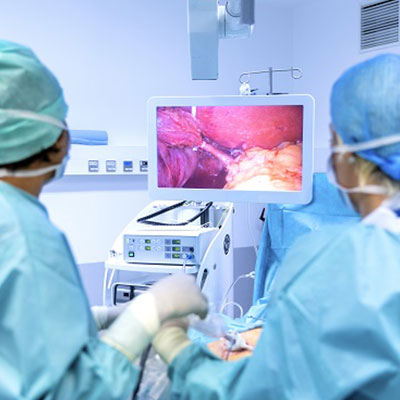
Prof. Dr. DulalKanti Majumder
Senior Consultant Urologist, Laparoscopic, Pelvic & Oncosurgeon
For Appointment Call :
+91 9830063492Email Me On :
doctordkm@gmail.com

Senior Consultant Urologist, Laparoscopic, Pelvic & Oncosurgeon


Laparoscopy is a type of surgical procedure that allows a surgeon to access the inside of the abdomen (tummy) and pelvis without having to make large incisions in the skin. This procedure is also known as keyhole surgery or minimally invasive surgery.
Is laparoscopy a major surgery?
Although patients tend to think of laparoscopic surgery as minor surgery, it is major surgery with the potential for major complications - visceral injury and bleeding, injury to the bowel, or injury to the bladder.
What is the recovery time from laparoscopic surgery?
If you've had laparoscopy to diagnose a condition, you'll probably be able to resume your normal activities within 5 days.
How long does a laparoscopy surgery take?
Surgery for endometriosis and ovarian cysts averaged 72 min (range 10-240). Laparoscopic myomectomy and hysterectomy averaged 113 and 131 min respectively (range 25-400). Our results show that while the operating time for most operative laparoscopies is less than 75 min, the range of operating times is great.
Why is laparoscopic surgery done?
This allows a surgeon to view the inside of the body without major trauma to the patient. Laparoscopy is known as minimally invasive surgery. It allows for shorter hospital stays, faster recovery, less pain, and smaller scars than traditional (open) surgery.
What is the side effect of laparoscopy?
The most common risks associated with a laparoscopy are bleeding, infection, and damage to organs in your abdomen. However, these are rare occurrences. After your procedure, it's important to watch for any symptoms of infection.
Do and don'ts after laparoscopy?
1. Don't drink alcohol or drive for at least 24 hours after surgery.
2. You can bathe any time after surgery.
3. You can remove the bandage the morning after the surgery. ...
4. You can typically return to work three days after surgery. ...
5. Do not be concerned if your urine is green.
Can I walk after laparoscopy?
Start by walking a little more than you did the day before. Bit by bit, increase the amount you walk. Walking boosts blood flow and helps prevent pneumonia and constipation. Avoid strenuous activities, such as bicycle riding, jogging, weight lifting, or aerobic exercise, until your doctor says it is okay.
How should I sleep after laparoscopy?
Sleeping on your back: Supine support is the best way to sleep after the laparoscopic surgery. Place a pillow under the knees to relieve the pressure from your lower back. Put a neutral size pillow under your neck. Avoid too large pillow to avoid strain on the neck and back.
What should I wear after a laparoscopy?
Pack very loose clothing to wear after surgery, preferably something without a waistband. An oversized pullover dress is ideal. You may also want to take mini-pads, socks, and slip-on shoes or house slippers.
How long does laparoscopy pain last?
The amount of discomfort can vary, but should go away within 48-72 hours. A heating pad should help. Your doctor will prescribe medicine to help relieve your abdominal (belly) pain. Take the prescription pain medicine for the first 48 hours as prescribed.
Laparoscopy is a type of surgical procedure that allows a surgeon to access the inside of the abdomen (tummy) and pelvis without having to make large incisions in the skin. This procedure is also known as keyhole surgery or minimally invasive surgery.